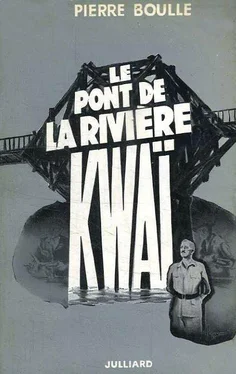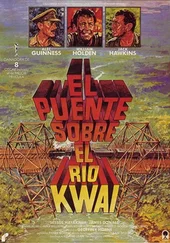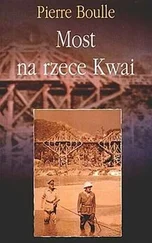“You don’t look altogether happy, Reeves,” said Colonel Nicholson to the R.E. captain, whose face showed every sign of suppressed anger. “What’s wrong?”
“What’s wrong! We simply can’t go on like this, sir! I tell you, it’s hopeless! I’d already decided to approach you on the subject today. And here’s Major Hughes, who’ll back me up.”
“What’s wrong?” the Colonel repeated with a frown.
“I agree with Reeves completely, sir,” said Hughes, who had left the building yards to join the C.O. “I also wanted to tell you this simply can’t go on.”
“But what?”
“It’s utter chaos, sir. Never in the whole of my career have I seen such carelessness and lack of system. We’re getting nowhere like this, just marking time. Everyone gives contradictory orders. These fellows, the Japs, haven’t the vaguest idea of man management. If they insist on interfering with the work, there’s not a hope of ever getting it done.”
The situation had certainly improved since the British officers had been put in charge of the squads, but although there were noticeable signs of progress in the quality as well as the quantity of the work, it was quite clear that things were far from perfect.
“Explain yourselves. You first, Reeves.”
“Sir,” said the Captain, taking a sheet of paper out of his pocket, “I’ve only made a note of the more glaring blunders; otherwise the list would go on forever.”
“Go ahead. I’m here to listen to any reasonable complaint, and to consider any suggestion. I can see there’s something wrong. It’s up to you to tell me what.”
“Well, in the first place, sir, it’s utter folly to build the bridge on this bit of ground.”
“Why?”
“It’s a quagmire, sir. Who ever heard of a railway bridge being built on shifting soil? Only savages like these would ever think of it. I’m willing to bet, sir, that the bridge will collapse the first time a train goes over it.”
“That’s rather serious, Reeves,” said the Colonel, keeping his light-blue eyes fixed on the junior officer.
“Very serious, sir. And I’ve tried to point that out to the Japanese engineer. Engineer, indeed! God, what a hopeless bungler! You can’t get any sense from a chap who’s never even heard of soil resistance, who gapes when you mention pressure tables, and who can’t even talk the King’s English. Yet I’ve been pretty patient, sir. I’ve tried everything to make him understand. I even arranged a little demonstration for him, in the hope that he couldn’t fail to believe what he saw with his own eyes. Just a waste of time. He still insists on building his bridge in this swamp.”
“A demonstration, Reeves?” asked Colonel Nicholson, whose interest was always aroused at the sound of this word.
“Quite a simple one, sir. A child could have understood it. You see that pile in the water, near the bank? I put that in myself with a sledge hammer. Well, it’s gone quite far down already, but it hasn’t yet found solid bottom. It’s still sinking, sir, just as all the other piles will sink under the weight of a train, I’m sure of it. What we ought to do is lay down a concrete foundation, but we haven’t got the materials.”
The Colonel gazed with interest at the pile and asked Reeves if he could repeat the demonstration for his benefit. Reeves gave the necessary orders. Some of the prisoners gathered round and began to heave on a rope. A heavy weight, slung from a scaffolding, dropped once or twice onto the top of the pile, which at once sank visibly deeper.
“You see, sir,” Reeves shouted triumphantly, “we could go on hammering away till doomsday, it would just go on sinking. And soon it’ll be under water.”
“I see,” said the Colonel. “How far down is it at the moment?”
Reeves gave him the exact figure, which he had noted, and added that the tallest trees in the jungle wouldn’t be long enough to reach solid bottom.
“Right,” said the Colonel with every sign of satisfaction. “That’s quite clear. As you say, even a child could understand. That’s the sort of demonstration I like. The engineer wasn’t impressed? Well, I am—and that’s the main thing, I assure you. Now, what solution do you suggest?”
“Shift the whole bridge, sir. I think there’s a good spot about a mile away. Of course, I’d have to check on it—”
“You must do so, then,” the Colonel calmly replied, “and give me the facts and figures for me to put before them.”
He made a note of this first point and asked:
“Anything else, Reeves?”
“The material they’re using on the bridge, sir. Cutting down these trees! That was a fine thing our men started, wasn’t it? But at least they knew what they were doing. Well, this hopeless engineer isn’t doing much better, sir. He just lets any old thing be cut down, without bothering if the wood’s hard or soft, rigid or flexible, or whether it will stand up to any stress laid on it. It’s an absolute disgrace, sir.”
Colonel Nicholson made a second entry on the bit of paper which served as a notebook.
“What else, Reeves?”
“I’ve kept this for the last, sir, because I think it’s the most important. You can see for yourself: the river’s well over a hundred yards across. It’s got high banks. The platform will be over a hundred feet above the water— that’s quite a proposition, isn’t it? Not child’s play. Well, I’ve asked the engineer several times to show me his working plans. He shook his head in the usual way, as they all do when they don’t know what to say. Well, believe it or not, sir, there isn’t a plan. He hasn’t made one! And he doesn’t intend to! Didn’t seem to know what it was all about! So what it boils down to is this: he thinks building a bridge is as easy as throwing a plank across a ditch— some pieces of wood here and there, and a few piles underneath! It’ll never stand up, sir. I’m absolutely ashamed to be taking part in such sabotage.”
His indignation was so genuine that Colonel Nicholson felt obliged to offer a few words of consolation.
“Don’t worry, Reeves. It’s a good thing you’ve got it off your chest. I can quite understand how you feel about it. Everyone has his pride, after all.”
“Exactly, sir. Frankly, I’d rather have another dose of punishment than help to give birth to this monstrosity.”
“I agree with you entirely,” said the Colonel, making a note of this last point. “It’s obviously rather serious, all this, and we can’t let things go on as they are. I’ll take the necessary steps, I promise you. Your turn now, Hughes.”
Major Hughes was as worked up as his colleague. This was a strange state for him to be in, for by nature he was cool and collected.
“Sir, we’ll never get any discipline in the building yards, or any serious work out of the men, so long as the Japanese guards interfere with our orders. Just look at them, sir— absolute oafs. Only this morning I’d split up the squads working on the embankment into three sections each: one for digging, another for carting off the earth, and the third for spreading it and leveling the mound. I’d taken the trouble to arrange the relative strength of each section myself and to organize the various tasks so as to synchronize them properly.”
“I see,” said the Colonel, his interest once more roused. “A sort of specialization system?”
“Exactly, sir. After all, I do know something about earthworks. I was a works manager before being a director. I’ve dug wells over three hundred feet deep. Well, anyway, this morning my teams began working according to this system. Everything was going fine. They were well ahead of the schedule laid down by the Japs. Splendid! Then up comes one of these apes and starts throwing his weight around, shrieking and yelling for the three sections to re-form as one. Easier to keep an eye on them, I suppose— the idiot! What’s the result? A complete mess, utter chaos. They’re all on top of each other and can’t get a move on. It’s enough to make you sick, sir. Just look at them.”
Читать дальше











